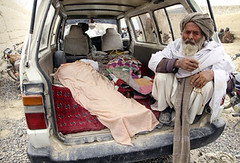In the latest blow to the American counterinsurgency and nation-building effort in Afghanistan, a U.S. Army sergeant with eleven years of service and three previous deployments under his belt, and a wife and two children back home, walked off his base in the Panjwai district of Kandahar province and massacred at least sixteen Afghan civilians in their homes, including nine children, afterward setting fire to the bodies.
The incident follows several recent controversies, including a videotape showing Marines urinating on the corpses of Taliban fighters, and an incident in which soldiers set fire to several Korans while burning trash from a prison outside Kabul. American officials fear that this latest atrocity will further outrage an already inflamed Afghan population, and jeopardize efforts to negotiate a resolution to the conflict before NATO forces leave, in 2014.
In this country, the percentage of Americans who want an immediate withdrawal from Afghanistan is now over half and appears to include Newt Gingrich, who said on Sunday, “We’re not prepared to be ruthless enough.”
The pessimism was shared by the outgoing British ambassador in Kabul, Sir William Patey, who told the Daily Telegraph that foreign forces have overstayed their welcome: “We were too focused on Iraq and we took our eye off the ball. We thought we had won [in Afghanistan] and the Taliban had run away and we just sort of left it to the Afghans to get on with it and we very quickly switched our focus to Iraq. You don’t normally write history so quickly but I’m pretty clear that we won’t have to wait too long for history to make that judgment.”
The massacre in Afghanistan is making a lot of people write history today. It’s the sort of incident that immediately symbolizes extreme violence and futility and the inevitable end of a war effort. It’s already in the books. After this, it’s impossible to imagine any kind of honorable and satisfactory conclusion to the decade of American involvement in Afghanistan. We already know that the Panjwai killings will have a prominent place in accounts of the Afghan war, like My Lai in South Vietnam and Abu Ghraib and Haditha in Iraq. And just as those atrocities stained everyone who had anything to do with those wars, Panjwai will be a blight on every soldier and civilian and policymaker who left any fingerprints on the Afghan war, no matter how good their intentions, no matter how hard they tried to make it come out right. More
